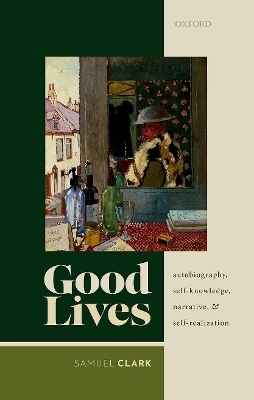
Good Lives
Oxford University Press (Verlag)
978-0-19-886538-4 (ISBN)
Reasoning with autobiography is a way to self-knowledge. We can learn about ourselves, as human beings and as individuals, by reading, thinking through, and arguing about this distinctive kind of text. Reasoning with Edmund Gosse's Father and Son is a way of learning about the nature of the good life and the roles that pleasure and self-expression can play in it. Reasoning with Siegfried Sassoon's Memoirs is a way of learning about transformative experience, self-alienation, and therefore the nature of the self. Good Lives: Autobiography, Self-Knowledge, Narrative, and Self-Realization develops this claim by answering a series of questions: What is an autobiography? How can we learn about ourselves from reading one? On what subjects does autobiography teach? What should we learn about them? In particular, given that autobiographies are narratives, should we learn something about the importance of narrative in human life? Could our storytelling about our own lives make sense of them as wholes, unify them over time, or make them good for us? Could storytelling make the self?
Samuel Clark provides an authoritative critique of narrative and a defence of a ^self-realization account of the self and its good. He investigates the wide range of extant accounts of the self and of the good life, and defends pluralist realism about self-knowledge by reading and reasoning with autobiographies of self-discovery, martial life, and solitude. The volume concludes by showing that autobiography can be reasoning in pursuit of self-knowledge; each of us is an unchosen, initially opaque, seedlike self; our good is the development and expression of our latent capacities, which is our individual self-realization; and self-narration plays much less role in our lives than some thinkers have supposed, and the development and expression of potential much more.
Samuel Clark is Senior Lecturer in Philosophy, Department of Politics, Philosophy, and Religion at Lancaster University.
1. Introduction
Part I
2. Routemap 1: Autobiography
3. Autobiography is Recollection
4. Autobiography is Reflection on Experience
5. Autobiography is Artefactual
6. Autobiography is a Genre
7. Autobiography is Narrative
8. Paradigm Autobiographical Form
9. Autobiography is a Local Tradition
10. Rationalism about Autobiography
11. Autobiography as Clue and as Container
12. Autobiography as Historical Data
13. Autobiography as Thought Experiment
14. Form enables Reasoning
15. Particular Reasoning
16. Diachronic Reasoning
17. Compositional Reasoning
18. Objection: Autobiographies are Novels
19. Self-reflective reasoning
20. Horizontal Connection not Vertical Generalization
21. Routemap 2: Uses of Autobiography
22. Two Purposes of Autobiography
23. The Delphic Demand
24. Explanation
25. Justification and Self-enjoyment
26. Selfhood
27. Good life
28. Reductionism about Meaning
29. Accounts of the Self
30. Taxonomies of the Self
31. Tasks for an Account of the Self
32. Accounts of the Good Life
33. Taxonomies of the Good Life
34. Tasks for an Account of the Good Life
35. The Self and its Good
36. Self-realization
37. Ethical Objections to Self-realization
38. Metaphysics of the Realizable Self
39. An Epistemological Objection to Self-realization
40. Experiential Objections to Self-realization
41. Routemap 3: from Part I to Part II
Part II
42. Narrativist Views
43. Routemap 4: The Dialectic between Narrative and Self-realization
44. Siegfried Sassoon s Memoirs
45. The Shape of a Life
46. Narrative Non-additivity
47. Non-narrative Explanations of Non-additivity
48. Neither Agents nor Temporal Sequences Explain Non-additivity
49. Telling does not Explain Non-additivity
50. Genre does not Explain Non-additivity
51. Self-realization Explains Non-additivity
52. Narrative Self-unification
53. Irony vs Rosati
54. Transformative Experience vs Schechtman
55. Against Narrative Self-unification
56. For Self-realization over a Life
57. Objection: The Self is a Self-interpretation
58. First Reply: Self vs Persona
59. Second Reply: Pluralist realism about Self-knowledge
60. Introspection is a Bad Method of Self-discovery
61. The Objective Stance is an Incomplete Method of Self-discovery
62. Pleasure as Self-discovery
63. John Stuart Mill s Autobiography
64. Edmund Gosse s Father and Son
65. Lessons from Mill and Gosse
66. Asceticism
67. Enlistment as Self-discovery
68. Solitude as Self-discovery
69. Asceticism as Self-discovery
70. Pluralist Realism about Self-knowledge
71. Self-knowledge and Self-realization
72. Autobiography and Self-knowledge
73. Routemap 5: Against Narrative, for Self-realization
74. Objection: What about You?
Works Cited
Index
| Erscheinungsdatum | 05.05.2021 |
|---|---|
| Verlagsort | Oxford |
| Sprache | englisch |
| Maße | 146 x 223 mm |
| Gewicht | 462 g |
| Themenwelt | Literatur ► Biografien / Erfahrungsberichte |
| Sachbuch/Ratgeber ► Geschichte / Politik | |
| Geisteswissenschaften ► Philosophie ► Ethik | |
| ISBN-10 | 0-19-886538-4 / 0198865384 |
| ISBN-13 | 978-0-19-886538-4 / 9780198865384 |
| Zustand | Neuware |
| Haben Sie eine Frage zum Produkt? |
aus dem Bereich


